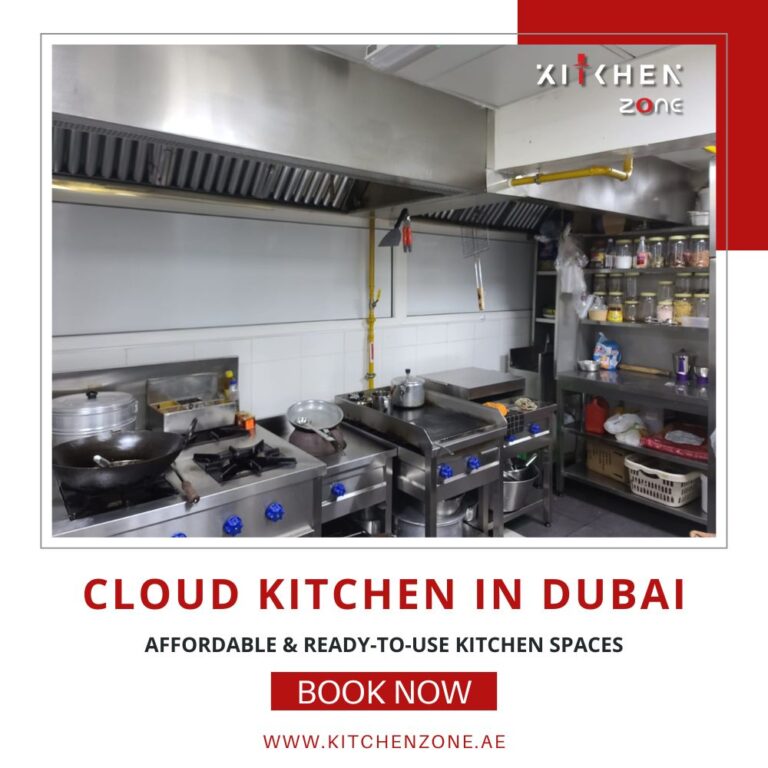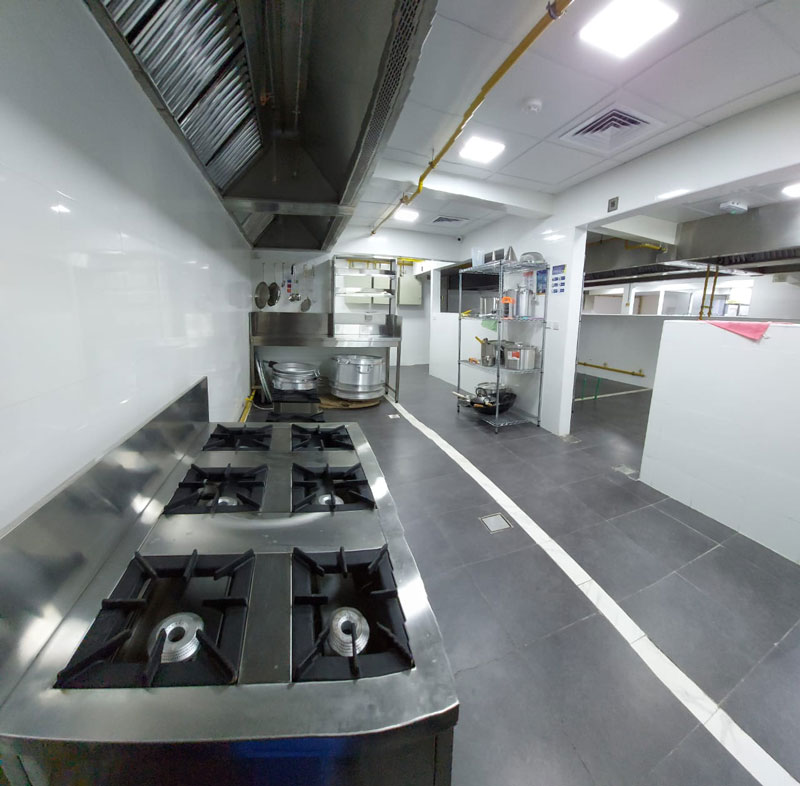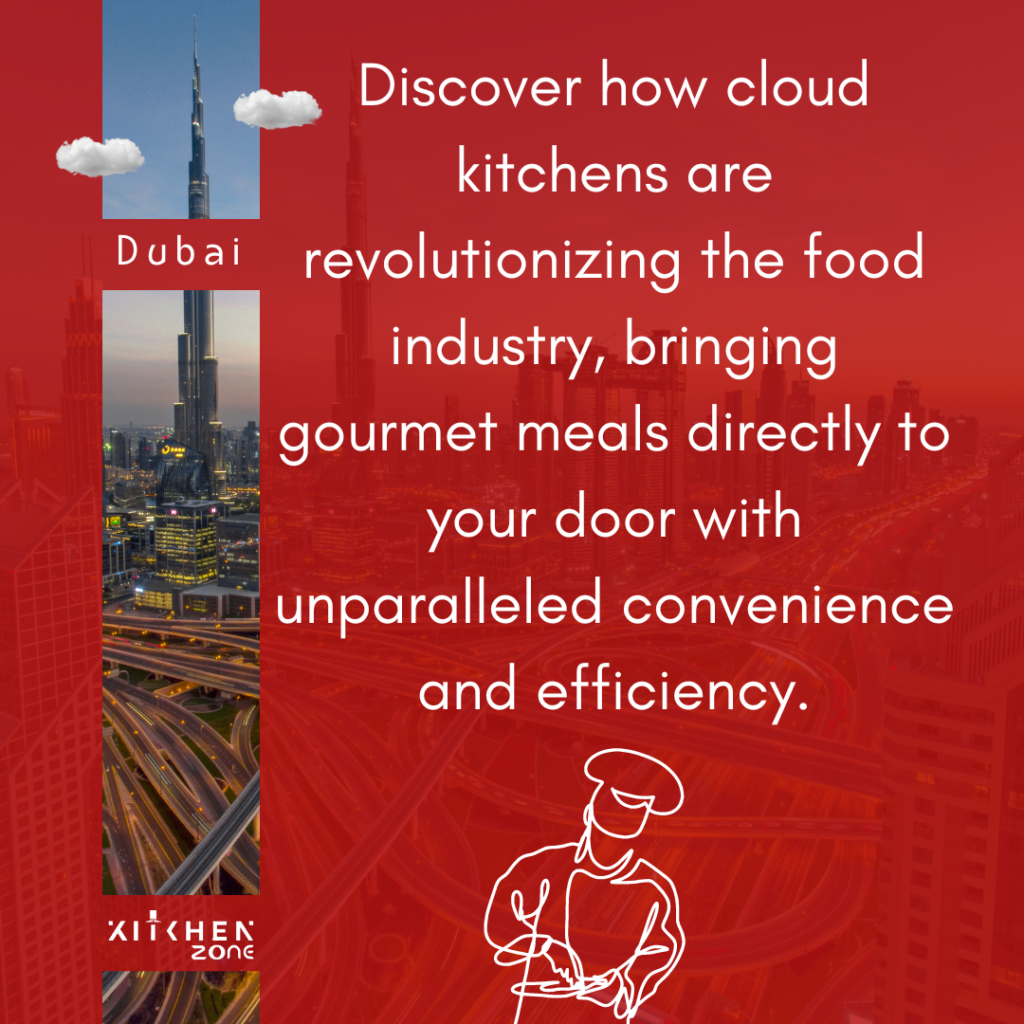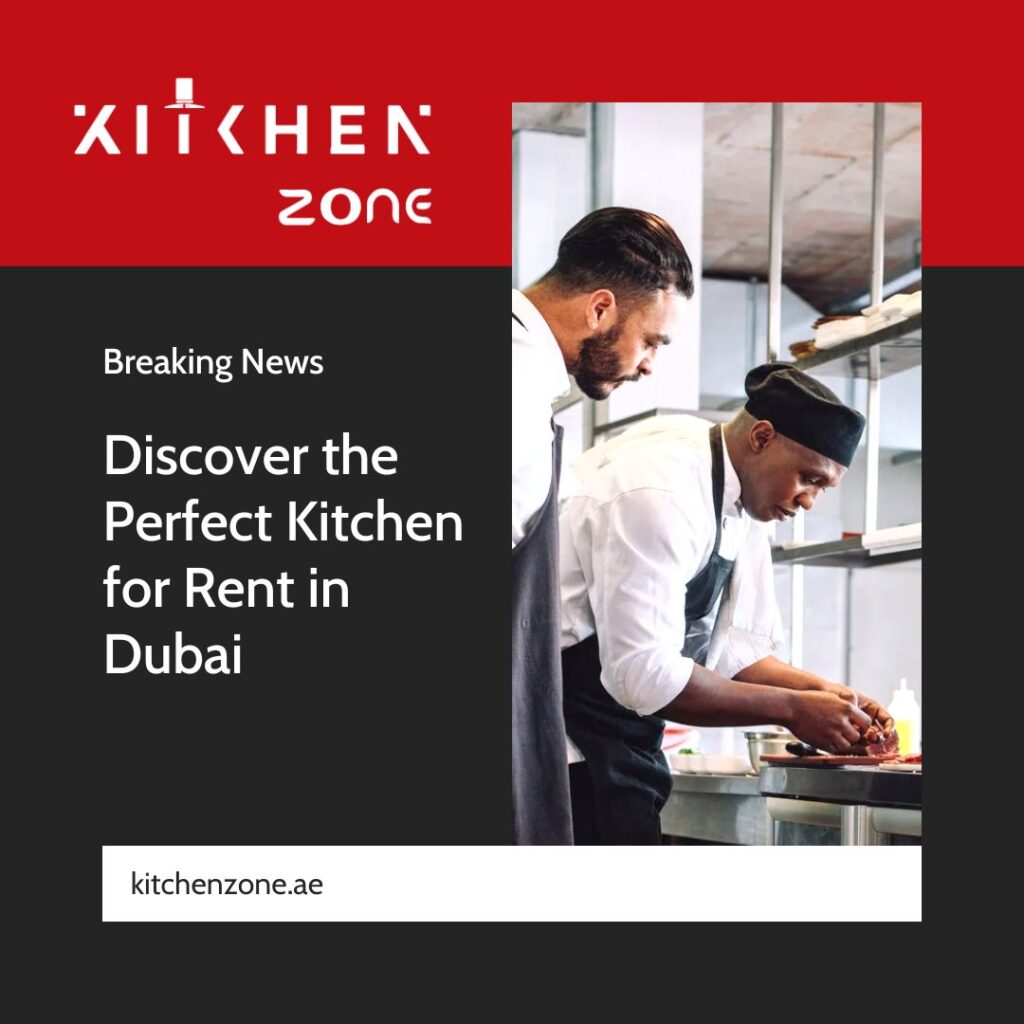Table of Contents
Unlocking Success: A Comprehensive Guide to Renting a Cloud Kitchen in Dubai
In the vibrant culinary landscape of Dubai, the demand for innovative dining solutions is soaring. Enter the cloud kitchen—a revolutionary business model that allows entrepreneurs to serve delicious meals without the overhead of a traditional restaurant. With the Emirate’s diverse food culture and tech-savvy population, renting a cloud kitchen has become a lucrative opportunity for aspiring chefs and established brands alike. But how do you navigate the complexities of this thriving sector? This comprehensive guide aims to demystify the process of renting a cloud kitchen in Dubai, offering essential insights on location selection, legal requirements, and operational tips. Whether you’re looking to launch your culinary venture or expand your existing food business, understanding the nuances of this dynamic industry is key to unlocking your success. Let’s dive in and discover how you can turn your culinary dreams into reality amidst the bustling backdrop of Dubai.
Understanding Cloud Kitchens: Definition and Concept
Cloud kitchens, also known as ghost kitchens, dark kitchens, or virtual kitchens, represent a modern culinary innovation designed to meet the increasing demand for food delivery services. These commercial kitchen spaces are optimized for the preparation of delivery-only meals, operating without a traditional dine-in facility. The concept hinges on the idea that food can be prepared in a centralized, professional environment and delivered to customers’ doorsteps, leveraging digital platforms and app-based ordering systems. This allows restaurateurs to focus more on food quality and delivery efficiency rather than on the overheads associated with running a full-service restaurant.
The core advantage of cloud kitchens lies in their operational model. By eliminating the need for a physical dining space, businesses can significantly reduce costs related to real estate, interior decor, and front-of-house staff. This streamlined approach enables entrepreneurs to allocate resources more effectively, focusing on kitchen equipment, culinary talent, and marketing strategies. Additionally, cloud kitchens often operate multiple brands from a single location, allowing for diverse menu offerings and catering to various culinary preferences without the need for separate storefronts.
The rise of cloud kitchens is closely tied to the digital revolution in the food industry. With the proliferation of food delivery apps and the growing preference for online food ordering, the demand for quick, reliable, and high-quality meal delivery has skyrocketed. Cloud kitchens are perfectly positioned to capitalize on this trend, providing a scalable and flexible solution for food entrepreneurs looking to tap into the lucrative delivery market. In cities like Dubai, where the population is tech-savvy and diverse, the potential for cloud kitchens to thrive is particularly pronounced.
The Rise of Cloud Kitchen in Dubai: Market Trends and Opportunities
Dubai has long been a melting pot of cultures and cuisines, making it a prime location for culinary experimentation and innovation. The city’s dynamic food scene is characterized by a high demand for diverse dining options, driven by both residents and tourists. The rise of cloud kitchens in Dubai is a reflection of these evolving consumer preferences, offering a convenient and efficient way to enjoy gourmet meals without leaving the comfort of one’s home. The market for cloud kitchens in Dubai is growing rapidly, fueled by the increasing popularity of food delivery apps and the city’s robust digital infrastructure.
Several factors contribute to the burgeoning cloud kitchen market in Dubai. The city’s strategic location as a global hub for business and tourism creates a vibrant and diverse customer base. This, combined with a high level of internet penetration and smartphone usage, makes Dubai an ideal environment for the growth of online food delivery services. Moreover, the COVID-19 pandemic has accelerated the shift towards delivery and takeaway options, further boosting the demand for cloud kitchens. As consumers seek more convenient and safe dining alternatives, the cloud kitchen model has emerged as a viable and attractive solution.
The opportunities for cloud kitchen businesses in Dubai are vast. From catering to specific dietary preferences such as vegan, keto, or gluten-free, to offering international cuisines and fusion dishes, the possibilities are endless. Entrepreneurs can experiment with different culinary concepts and quickly adapt to market trends without the constraints of a physical restaurant. Additionally, the ability to operate multiple brands from a single kitchen allows for greater flexibility and efficiency, enabling businesses to maximize their reach and profitability. As the cloud kitchen market in Dubai continues to expand, the potential for success is immense for those who can navigate the competitive landscape and deliver exceptional food experiences.
Key Benefits of Renting a Cloud Kitchen
One of the most significant advantages of renting a cloud kitchen is the cost savings. Traditional restaurants require substantial investments in real estate, interior design, and front-of-house staff, which can be a considerable financial burden for new entrepreneurs. In contrast, cloud kitchens eliminate the need for a physical dining space, allowing businesses to operate with lower overhead costs. This cost-efficiency enables food entrepreneurs to allocate more resources towards high-quality ingredients, advanced kitchen equipment, and marketing efforts, ultimately enhancing the overall quality of their offerings.
Flexibility is another key benefit of the cloud kitchen model. Renting a cloud kitchen allows businesses to experiment with different culinary concepts and menus without the long-term commitment associated with traditional restaurant leases. This agility is particularly valuable in a dynamic market like Dubai, where consumer preferences can change rapidly. Cloud kitchen operators can quickly adapt to emerging trends and customer feedback, launching new brands or modifying existing menus with minimal risk. The ability to operate multiple virtual brands from a single kitchen further enhances this flexibility, enabling businesses to cater to diverse tastes and maximize their market reach.
Scalability is also a crucial advantage of cloud kitchens. As demand for online food delivery continues to grow, cloud kitchen operators can easily expand their operations to meet this demand. By leveraging technology and efficient kitchen workflows, businesses can increase their production capacity and serve a larger customer base without the need for additional physical space. This scalability is particularly important in a bustling city like Dubai, where the potential for growth in the food delivery market is significant. With the right strategies and infrastructure in place, cloud kitchen businesses can achieve rapid growth and success.
Factors to Consider When Choosing a Cloud Kitchen Location
Selecting the right location for your cloud kitchen is a critical decision that can significantly impact your business’s success. One of the primary factors to consider is proximity to your target customer base. Since cloud kitchens focus on delivery, it’s essential to choose a location that allows for quick and efficient delivery times. This not only ensures that your food reaches customers fresh and hot but also improves customer satisfaction and loyalty. Analyzing demographic data and identifying areas with high demand for food delivery services can help you make an informed decision.
Another important consideration is the availability of delivery infrastructure in the chosen location. Reliable access to delivery drivers and logistics services is crucial for the smooth operation of a cloud kitchen. Partnering with established food delivery platforms and ensuring that your location is within their service zones can streamline the delivery process and enhance efficiency. Additionally, consider the traffic patterns and road connectivity in the area, as these factors can impact delivery times and operational costs.
The cost of renting a cloud kitchen space is also a significant factor to consider. While cloud kitchens are generally more cost-effective than traditional restaurants, rental rates can vary based on the location and demand. It’s essential to conduct a thorough cost analysis and budget accordingly to ensure that the chosen location aligns with your financial projections. Consider the potential return on investment and weigh the benefits of a prime location against the associated costs. Balancing affordability with strategic location can help you optimize your operations and achieve long-term success.
Essential Equipment and Infrastructure for a Cloud Kitchen
Equipping your cloud kitchen with the right tools and infrastructure is essential for efficient and high-quality food production. The foundation of a successful cloud kitchen lies in its kitchen equipment, which should be tailored to your specific culinary needs and menu offerings. Investing in commercial-grade appliances such as ovens, stoves, refrigerators, and food processors can enhance your kitchen’s efficiency and ensure consistent food quality. Additionally, modular and versatile equipment can help you adapt to changing menu requirements and optimize your kitchen space.
In addition to kitchen appliances, maintaining a well-organized and functional kitchen layout is crucial for smooth operations. Cloud kitchens often operate with limited space, making it essential to maximize every square foot. Implementing efficient kitchen workflows and storage solutions can help streamline food preparation and minimize downtime. Consider the placement of workstations, storage areas, and cooking equipment to create a logical and ergonomic layout that supports your kitchen staff’s productivity and safety.
Technology also plays a vital role in the success of a cloud kitchen. Implementing a robust order management system can help you handle incoming orders efficiently and reduce the risk of errors. Integrating your kitchen operations with food delivery platforms and point-of-sale systems can streamline the order fulfillment process and improve overall efficiency. Additionally, investing in kitchen management software that tracks inventory, monitors food safety, and analyzes performance data can provide valuable insights and help you optimize your operations.
Navigating Legal Requirements and Licensing for Cloud Kitchen in Dubai
Operating a cloud kitchen in Dubai requires compliance with various legal and regulatory requirements. The first step in this process is obtaining the necessary licenses and permits from the relevant authorities. The Dubai Municipality and the Department of Economic Development (DED) are the primary regulatory bodies overseeing food businesses in the Emirate. You will need to apply for a food license from the Dubai Municipality and a trade license from the DED to legally operate your cloud kitchen.
Ensuring that your cloud kitchen meets health and safety standards is also crucial. The Dubai Municipality has strict guidelines regarding food hygiene, handling, and storage, which must be adhered to. Regular inspections are conducted to ensure compliance with these standards, and failure to meet the requirements can result in fines or closure of the kitchen. Implementing robust food safety protocols, training your staff on hygiene practices, and maintaining proper documentation can help you navigate these regulatory requirements and ensure the smooth operation of your cloud kitchen.
Additionally, it’s essential to stay informed about any changes in regulations that may impact your business. The legal landscape for food businesses can evolve, and staying proactive in understanding and complying with new requirements is vital. Engaging with legal advisors or consultants who specialize in the food industry can provide valuable guidance and help you navigate the complexities of the regulatory environment. By ensuring compliance with all legal requirements, you can build a trustworthy and reputable cloud kitchen business in Dubai.
Cost Analysis: Budgeting for Your Cloud Kitchen Rental
Effective budgeting is a cornerstone of a successful cloud kitchen venture. The first step in creating a budget is to identify and estimate all potential expenses associated with setting up and operating your cloud kitchen. These expenses can be categorized into initial setup costs and ongoing operational costs. Initial setup costs include expenses related to renting the kitchen space, purchasing equipment, obtaining licenses and permits, and any necessary renovations or modifications to the space. It’s important to conduct thorough research and obtain accurate cost estimates to ensure that your budget is realistic and comprehensive.
Ongoing operational costs are recurring expenses that will impact your cloud kitchen’s profitability. These include rent, utilities, salaries for kitchen staff, ingredient costs, packaging materials, and marketing expenses. Additionally, consider the costs associated with delivery logistics, such as partnering with food delivery platforms and paying delivery drivers. It’s essential to monitor these expenses closely and identify opportunities for cost-saving without compromising on quality. Implementing efficient inventory management practices, negotiating favorable terms with suppliers, and optimizing kitchen workflows can help you control operational costs and improve your bottom line.
Revenue projections are also a critical component of your budget. Estimating your potential sales based on market research, target customer base, and pricing strategy can help you set realistic financial goals. Consider factors such as average order value, order frequency, and customer acquisition costs when projecting your revenue. By creating a detailed and well-structured budget, you can gain a clear understanding of your financial requirements and make informed decisions to ensure the long-term success of your cloud kitchen business.
Marketing Strategies to Promote Your Cloud Kitchen
Effective marketing is essential for attracting customers and driving sales for your cloud kitchen. One of the most powerful tools at your disposal is digital marketing, which allows you to reach a wide audience and engage with potential customers online. Developing a strong online presence through social media platforms, such as Instagram, Facebook, and Twitter, can help you build brand awareness and connect with your target audience. Sharing visually appealing content, such as food photos, behind-the-scenes glimpses, and customer testimonials, can create a buzz around your cloud kitchen and encourage people to try your offerings.
Partnering with food delivery platforms is another effective marketing strategy. These platforms often have a large user base and can provide valuable exposure for your cloud kitchen. Participating in promotional campaigns, offering discounts or special deals, and optimizing your menu listings on these platforms can help you attract more orders and improve your visibility. Additionally, encouraging satisfied customers to leave positive reviews can enhance your reputation and build trust with potential customers.
Local marketing initiatives can also play a significant role in promoting your cloud kitchen. Collaborating with local influencers, food bloggers, and community groups can help you reach a more targeted audience and generate word-of-mouth referrals. Hosting virtual cooking classes, offering limited-time exclusive menu items, and participating in local food festivals or events can create excitement and drive engagement. By leveraging a mix of online and offline marketing strategies, you can effectively promote your cloud kitchen and build a loyal customer base.
Success Stories: Case Studies of Successful Cloud Kitchen in Dubai
The success of cloud kitchens in Dubai can be illustrated through several inspiring case studies. One notable example is Kitopi, a managed cloud kitchen platform that has achieved remarkable success in the region. Founded in 2018, Kitopi has rapidly expanded its operations, partnering with numerous restaurant brands to streamline their delivery operations. By providing end-to-end kitchen management services, including food preparation, packaging, and delivery logistics, Kitopi has enabled its partners to scale their businesses efficiently and reach a wider audience. The company’s innovative approach and commitment to quality have made it a leading player in the cloud kitchen market.
Another success story is that of Sweetheart Kitchen, a data-driven cloud kitchen concept that focuses on delivering high-quality, chef-crafted meals. By leveraging advanced technology and data analytics, Sweetheart Kitchen has optimized its kitchen operations and menu offerings to meet the evolving preferences of its customers. The company’s emphasis on using fresh ingredients, maintaining stringent hygiene standards, and offering diverse menu options has earned it a loyal customer base and a strong reputation in the Dubai food delivery market. Sweetheart Kitchen’s ability to adapt to market trends and deliver exceptional food experiences has been key to its success.
ChefX, a virtual kitchen brand that specializes in delivering gourmet meals, is another example of a successful cloud kitchen in Dubai. By collaborating with renowned chefs and leveraging their culinary expertise, ChefX has created a unique dining experience for its customers. The company’s focus on high-quality ingredients, innovative recipes, and efficient delivery has set it apart in the competitive market. ChefX’s success demonstrates the potential of cloud kitchens to offer premium dining experiences and cater to discerning customers who seek convenience without compromising on quality.
Conclusion: Taking the Next Steps to Launch Your Cloud Kitchen
Launching a cloud kitchen in Dubai presents an exciting opportunity to tap into the growing demand for food delivery services and cater to a diverse and dynamic market. By understanding the cloud kitchen concept, analyzing market trends, and leveraging the benefits of this innovative business model, you can position your culinary venture for success. Carefully considering factors such as location, equipment, legal requirements, and budgeting is essential for setting a strong foundation for your cloud kitchen.
Effective marketing strategies and a commitment to quality can help you attract and retain customers, while learning from the success stories of established cloud kitchens can provide valuable insights and inspiration. As you embark on your cloud kitchen journey, staying adaptable and responsive to market trends will be key to navigating the competitive landscape and achieving long-term success.
The vibrant culinary landscape of Dubai offers immense potential for cloud kitchens to thrive. With the right strategies and a passion for delivering exceptional food experiences, you can unlock the success of your cloud kitchen and turn your culinary dreams into reality amidst the bustling backdrop of Dubai. Whether you’re an aspiring chef or an established food entrepreneur, the cloud kitchen model presents a unique and promising avenue to reach new heights in the food industry.





